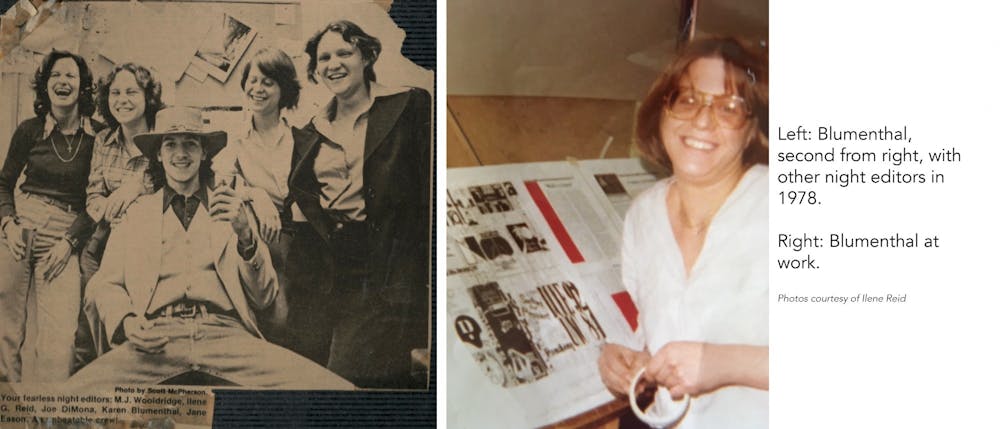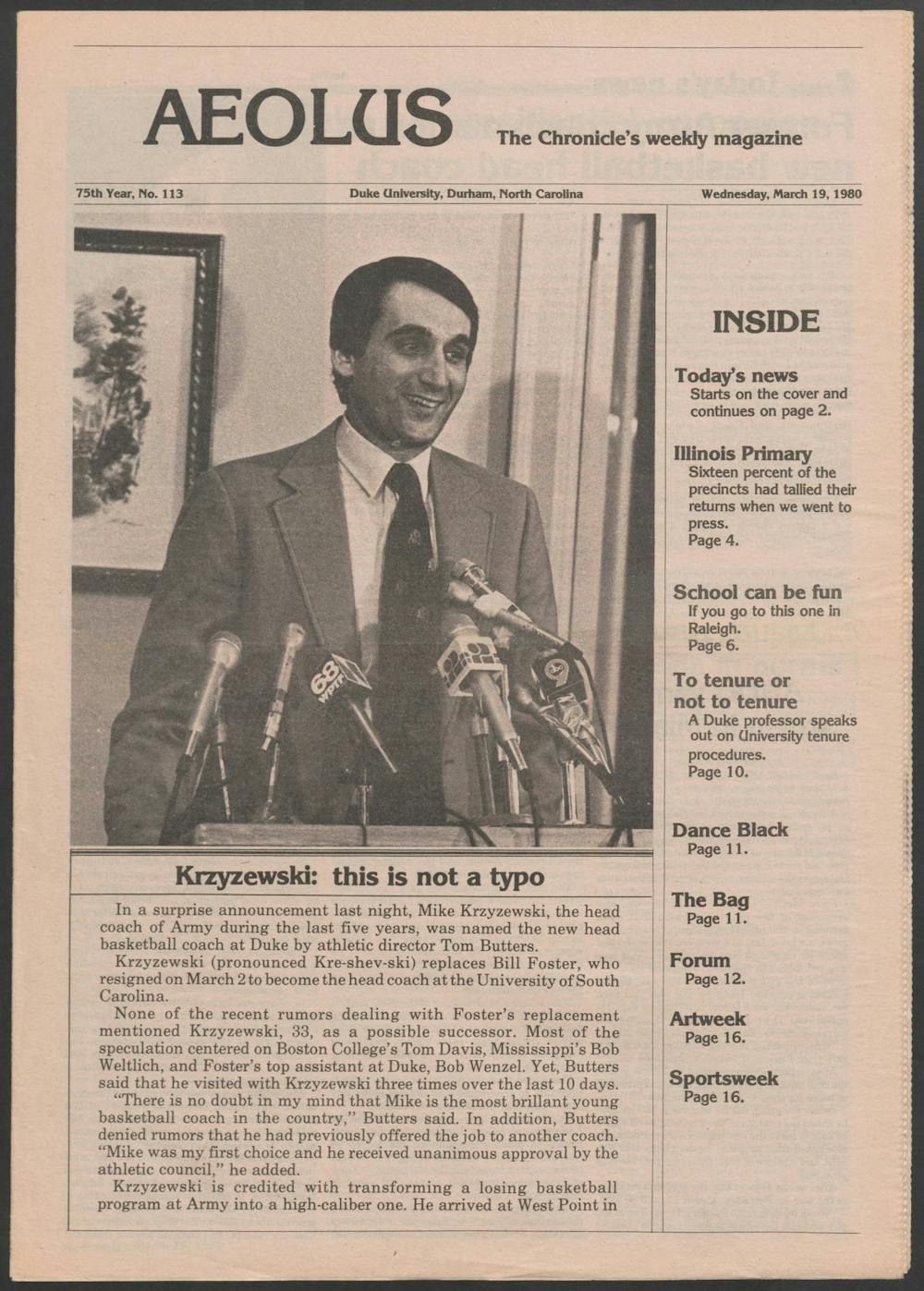Karen Blumenthal always said that her four years as a student at The Chronicle gave her the great loves of her life—journalism and her husband, Scott McCartney.
In turn, she helped lead the paper’s publishing board through the 2008 financial crisis and mentored a generation of student journalists over family-style dinners at Bullock’s Bar-B-Cue, all as she pursued a successful career in business journalism and book writing.
Blumenthal, Trinity ‘81 and former Chronicle editor-in-chief, died Monday at the age of 61 due to a heart attack. She is survived by Scott McCartney, co-chair of Duke Student Publishing Company’s board, which publishes The Chronicle; their daughters, Abby and Jen McCartney; her brother, Brad Blumenthal; and her mother, Beverly Blumenthal.
Blumenthal spent more than two decades at The Wall Street Journal, served as business editor for the Dallas Morning News and wrote a dozen books. She co-chaired DSPC’s board, which publishes The Chronicle, from 2007 to 2011.
“She was going to throw herself fully into whatever it was she was doing or fighting for, or books she was trying to finish writing,” Jen McCartney said.
With The Wall Street Journal, Blumenthal covered business areas ranging from bankruptcies to retail, wrote a personal finance column and served as Dallas bureau chief for eight years. In that role, she edited a story on the 9/11 terrorist attacks that was part of the paper’s Pulitzer Prize-winning coverage.
She lived in Dallas with Scott McCartney, Trinity ‘82 and The Wall Street Journal’s Middle Seat columnist. She turned to writing nonfiction books for young people, and the most recent was “Jane Against the World: Roe v. Wade and the Fight for Reproductive Rights.”
Blumenthal was heavily involved with the Friends of the Dallas Public Library and co-taught Business Journalism with Scott McCartney at Duke this past semester. In 2009, to recognize her career achievements in journalism, Duke’s DeWitt Wallace Center gave her the Futrell Award, the center’s highest honor.
“She was like a one-person show, and within minutes of meeting her I was just enthralled with her and could completely see her passion for The Chronicle and journalism,” said Chrissy Beck, general manager of The Chronicle.
‘A really special, talented person’
Blumenthal arrived at Duke and The Chronicle from Dallas in 1977. She majored in economics and earned an A.B. Duke scholarship.
“Because I had a fondness for numbers and an interest in business, I thought I might become an accountant,” Blumenthal wrote on her website. “Then I wandered up to the newspaper office and ended up pretty much moving in.”
During her first two years, she was a reporter, night editor and editor of Aeolus, which at the time was a weekly magazine.

“Clearly, from the beginning you could see that she was just a really special, talented person. She just stood out,” said Ilene Reid, Trinity ‘81. “She was warm and funny.”
The staff elected Blumenthal editor-in-chief for her junior year. She also interned for Texas Monthly for a summer, taught second grade at the Judeo Reform Congregation and was an apprentice at Duke Press, according to the story Reid wrote announcing Blumenthal’s election to the editorship in March 1979.
That year, Blumenthal helmed the paper through its coverage of the Greensboro massacre and the arrival of Coach Mike Krzyzewski.

Students who worked with her at The Chronicle described her as being professional and leading by example.
“She was very serious about it,” Nina Gordon, Trinity ‘80, said. “It mattered that we wrote good stories and that we spoke to the people we needed to speak to.”
Blumenthal’s tenure as editor came to a—customary at the time—soggy conclusion at the end of her junior year.
“We had a tradition, on the last day of publication, of taking the outgoing editor and carrying them down to the pond in the gardens and throwing them in,” Reid said.
As Blumenthal vacated the editorship, Scott McCartney took the reins. The couple had met when he, a year behind her in school, walked into the office for his first story.
“My mom gave my dad his first assignment, and the joke was that continued for about 40 years,” Abby McCartney said.
Although Scott McCartney enjoyed writing, he kept making spelling and stylistic errors for the first several weeks.
“Finally she just hauled off and threw a stylebook at him, which I guess got his attention,” Abby McCartney said.
Their time in The Chronicle office together was just the beginning of the decades-long partnership.
“For us growing up, The Chronicle really symbolized so much because we knew that they had not only loved working at it and been the reason they were both journalists,” Jen McCartney said, “but it was where they met and really formed their working partnership, as well as their friendship and relationship.”
Paul Goldberg, Trinity ‘81, worked at The Chronicle with Blumenthal and was friends with her throughout college.
“She got me into The Chronicle, she allowed me to work on my voice and was a great friend throughout,” Goldberg said.
Harsha Murthy, Trinity ‘81, said his most striking memory of Blumenthal was that she was so completely dedicated to The Chronicle—she was in the office pretty much every time he went up there.
“This was like a full-time job for her,” Murthy said. “I just admired the work ethic, and she was able to keep people together.”
As serious as she was about the paper’s reporting and style, Blumenthal also worked to make it fun. Reid recalled that she organized a trip to the state fair. And one night, along with a group of staff, she decided to find the best cheesecake in Durham.
After sharing cheesecake at a handful of restaurants, Blumenthal turned the quest into a meticulous story detailing the Durham cheesecake scene.
Blumenthal and Reid had a long-running debate about the proper composition of chocolate chip cookies. Reid swore by the apportionment of chocolate chips in a recipe from her seventh-grade home economics class.
“Karen, however, thought it was a sin against humanity to not include the entire bag,” Gordon said.
‘Extraordinary body of work’
After graduating in 1981, Blumenthal worked at the Dallas Morning News before joining The Wall Street Journal’s Dallas bureau. She returned to the Morning News for a couple of years as business editor, then Blumenthal headed back to the WSJ to serve as Dallas bureau chief for eight years.
“Karen was long a beloved and admired colleague and member of the WSJ family,” Matt Murray, editor-in-chief of The Wall Street Journal, said in the paper’s story on her death.
Blumenthal pivoted to writing a personal finance column for about five years, then headed fully to the world of book publishing. In total, she wrote nine books for young people on topics ranging from Bonnie and Clyde to Title IX, and three books aimed at adults that centered on personal finance.
Her book on prohibition was a finalist for a YALSA Excellence in Nonfiction for Young Adults Award, another on the 1929 stock market crash earned a Sibert Honor Book award and the book on Title IX earned a Jane Addams Children's Book Award, according to MacMillan Publishers. Her latest book, on Roe v. Wade, was published in February and reviewed by The New York Times.
Blumenthal and Scott McCartney traveled to Duke frequently this past semester to co-teach a business journalism class in Duke’s DeWitt Wallace Center for Media and Democracy.
In 2009, the Center recognized Blumenthal with the “Futrell Award for Outstanding Achievement in Communications and Journalism,” which is presented to one alumnus each year.
Bill Adair, director of the DeWitt Wallace Center and Knight Professor of the Practice of Journalism and Public Policy, said he views the Futrell Award as a lifetime achievement award, though recipients often go on to keep doing great journalism after winning it.
“It was given because of the extraordinary body of work that she had done, even by that point—and that was early, before she had written many of the books that she went on to write,” said Adair. “So it just speaks to all she had done in the first chapter of her career.”
The final WSJ byline of Blumenthal’s career came long after she began writing books full time.
Last year, Blumenthal took over Scott McCartney’s Middle Seat column for a day to tell readers what it was like to be married to the airline writer. She wrote about travelling as “Mrs. Middle Seat,” about his love of airports and their compromise on when to board.
And the unknowing gate agents who dare to violate a contract of carriage.
“My job: Remind him that he has a power greater than indignation,” Blumenthal wrote in the column. “‘Don’t argue,’ I tell him. ‘Just write about it.’”
‘I really looked up to her’
Blumenthal and David Ingram, Trinity ‘03 and a former Chronicle editor-in-chief, took over together as DSPC board chairs in 2007. During their tenure, they led the board through the 2008 financial crisis and its first time trimming a day of print.
“Karen in my mind, and I’m not overstating this, is the reason we’re in the good shape that we are today financially,” Beck said.
In response to the economic downturn, Blumenthal and the board looked to diversify the newspaper’s revenue, so they began to solicit donations for the first time. She also helped launch The Chronicle’s alumni network, Ingram said.
In addition to the seasoned business reporter’s financial foresight, Blumenthal pushed the paper to take strategic planning seriously and grow digitally.
Ingram said that despite living so far away, Blumenthal insisted on being in Durham for the board’s four yearly meetings. She made the most of her visits.
On each of those weekend visits, Blumenthal and Ingram spent Friday meeting with administrators, then took staff out to dinner at Bullock’s Bar-B-Q in Durham. On Saturday they would have the board meeting, then on Sunday they might take the students out for ice cream, Ingram said.
“She redefined what it meant to be chair of the board that supports The Chronicle,” Ingram said.
In meetings with administrators, Blumenthal took the opportunity to fiercely defend the paper and its needs.
“She was a force of nature in meetings with administrators,” Ingram said. “Because if she felt that administrators really understood the value of a free press, they had no greater friend than Karen. But if she got the sense that an administrator was threatening The Chronicle in any way—whether it was space on campus or access to resources—an administrator would have no worse enemy.”
Lindsey Rupp, Trinity ‘12, was an editor-in-chief during Blumenthal’s tenure on the board. Rupp said that she thought of Blumenthal as her “Chronicle mom,” because she was so close to the staff and fielded questions when they got into jams, but respected the role of the editor.
Everyone wanted to go to dinner with Blumenthal when she came to town, and that carried over to brunches in New York and meeting up when Rupp visited Texas.
“I think the most amazing thing about Karen is that she’s this incredible badass, like she just was so tough and so sharp and fearless,” Rupp said. “But she was also somehow incredibly warm, and she was this doting mom and she adored her husband Scott.”
Rupp said Blumenthal was her “model for what ‘having it all’ could look like.”
“I think for a whole generation of Chronicle editors, they saw the way that Karen made decisions and led her life and thought, ‘I hope to be that someday,’” Ingram said.
Blumenthal helped David Graham, Trinity ‘09, get a reporting internship in the Middle East. When he came back and expressed his excitement about business journalism, she spent more than an hour on the phone walking him through Duke’s financial documents.
“Karen was the most important mentor I ever had,” Graham said.
The Chronicle welcomes letters to the editor in memory of Karen Blumenthal. Submissions should be sent to chronicleletters@duke.edu by Tuesday, May 26.
Get The Chronicle straight to your inbox
Signup for our weekly newsletter. Cancel at any time.
Bre is a senior political science major from South Carolina, and she is the current video editor, special projects editor and recruitment chair for The Chronicle. She is also an associate photography editor and an investigations editor. Previously, she was the editor-in-chief and local and national news department head.
Twitter: @brebradham
Email: breanna.bradham@duke.edu

